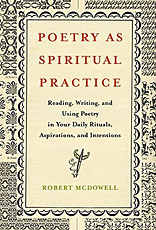Robert McDowell's poems, stories, essays, and reviews have appeared in hundreds of magazines and anthologies both here and abroad. He has taught at many universities and writers' conferences and was founding publisher/editor of Story Line Press. In addition, he coaches businesses interested in improving spiritual awareness, communication, writing, and presentation skills. For more information on his work, visit his website www.robertmcdowell.net.
Given the richness of form and content of poetry down through the centuries, it is a crime that many modern schools have eschewed it by teaching it less and less. McDowell laments the lack of the poetic spirit among entrepreneurs and business persons as well, evident in the lack of interest in imagination and thinking outside the box. Equally sad for the author is the disregard of poetry in western religion. He points to the creativity of Saint John of the Cross, Hildegard of Bingen, Mirabai, Hafiz. and Rumi who have spurred our spirit with their sacred poetry. McDowell connects poetry with spiritual practice:
"It is reading poems, writing your own poems, and making them part of your daily rituals, aspirations, and intentions. By assuming certain postures, participating in call-and-response, meditating and reciting poems, chants, hymns, prayers, mantras, songs, and scripture, you make yourself a tuning fork ready for the thwack of the Divine."
McDowell points to The Serenity Prayer as an example of the benefits of poetry as spiritual practice on a global scale. He quotes Robert Bly: "Reclaiming the sacred in our lives naturally brings us close once more to the wellsprings of poetry." Everyone has a poet within but he or she must first be freed from fears about this art form. McDowell presents an innovative series of exercises to help us learn to write and read poetry. We can turn to it for inspiration and use it as a tool for long looking and introspection. In three crucial chapters, the author covers:
• Clearing Obstacles: Joyful Rituals of Poetry as Practice
• Nursery Rhymes, Chants, and Hymns: Early Encounters with Poetry as Practice
• The Shape of Practice: Waking Up Through Poetry
Other chapters cover the sound and language of poetry, its building blocks, rhythms, meters, and forms. There are also probes of eight traditional poetry forms and the genres of elegy, free verse, and narratives. McDowell concludes:
"Poetry enriches and deepens spiritual practice, inspires practice-specific mentor-apprentice relationships, and immeasurably contributes to creating mentor-apprentice relationships in all walks of life. Today, poetry is more important than ever in creating and maintaining a life of compassion and awareness."
As people who have had their own spiritual journeys jumpstarted at various times by W. H. Auden, e. e. cummings, Rumi, Hafiz, and Mary Oliver, we couldn't agree more. McDowell has made an important contribution to the literature of spirituality and practice.
